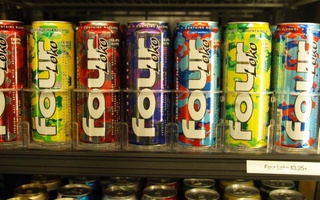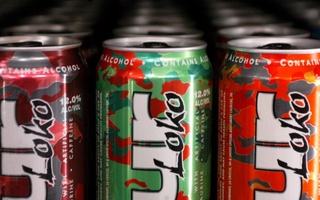The debate surrounding the effects of caffeinated alcoholic beverages on the human body still continues, although it has been three months since the Food and Drug Administration ordered the drinks—including the well-known Four Loko—pulled from the shelves.
In a lecture yesterday at the Harvard School of Public Health, Boston University Professor of Community Health Sciences Jonathan Howland questioned caffeine’s supposed ability to counteract the sedating effects of alcohol.
“Ultimately caffeine does not reduce the impairment effect of alcohol,” Howland said.
Howland and his research team have conducted several experiments with participants under the influence of caffeinated and non-caffeinated alcoholic beverages.
The results provided evidence that there were no differences in performance between users of caffeinated and non-caffeinated alcoholic drinks, as reaction time in a driving simulator was similarly impaired for both sets of participants.
The marketing of caffeine as a product that will clear the mind and increase attention span reinforces the belief that caffeine staves off the impairment effects of alcohol, according to Howland.
The lecture also addressed whether caffeinated alcoholic beverages truly cause risky behaviors.
An alternative hypothesis is that impulsive people—who already possess an inherent tendency to engage in risky behaviors—favor the consumption of beverages like Four Loko.
“Although the number of students that end up in the hospital from drinking too much has been increasing, the idea that all of these hospitalizations are caused by caffeinated alcoholic beverages is overreaching,” Howland said.
Ellen V. Connorton, a post-doc at the School of Public Health, said the possibility of reverse causation seems plausible.
She added that the publicity the beverages have received may have increased demand.
“Everybody got notifications from colleges that these drinks were responsible for a number of effects and students responded by saying ‘Wow, I gotta try this stuff!’” she said.
Howland’s team has published a paper on the subject and will continue to investigate the relationship between risky behaviors and the consumption of caffeinated alcoholic beverages.
In addition, Howland addressed the FDA studies on caffeinated alcoholic beverages completed before the quick enactment of a ban about three months ago.
He said that the FDA may have been pressured by bans implemented by certain states.
“[The FDA] moved from surveys to shutting down businesses, so there seemed to be a short trip,” he said. “Public policy on caffeinated alcohol beverages should be informed by rigorous research.”
Read more in News
After Four Year Hiatus, Early Action Admissions Policy To Return to Harvard College This FallRecommended Articles
-
LETTER: In Defense of Bottled WaterBottled water is an important choice in situations where there is a lack of water fountains or concern about water quality.
-
 Harvard College Warns of Four Loko’s Risks
Harvard College Warns of Four Loko’s Risks -
Massachusetts State Regulators To Ban Four Loko SalesMassachusetts regulators will soon restrict sales of caffeinated alcoholic beverages, including the popular Four Loko brand drinks.
-
Massachusetts To Restrict Sales of Four LokoMassachusetts regulators will soon restrict sales of caffeinated alcoholic beverages, including the popular Four Loko brand drinks.
-
 Four Loko Will Go Caffeine-Free
Four Loko Will Go Caffeine-Free -
Massachusetts Four Loko Ban Raises QuestionsIn the wake of growing controversy and public health concerns, Massachusetts last week became the fifth state in the U.S. to ban the sale of the much-publicized drink Four Loko.













